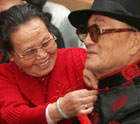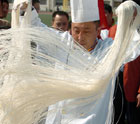
Throughout his career as a university professor, Xu Yong has given hundreds of lectures to many different types of audience, but none of these experiences could have prepared him for the talk on grassroots democracy he had to deliver one afternoon last November.
The veteran speaker was unable to shake off his nervousness during the entire 100-minute duration of the talk.
His audience might have had something to do with it: That day he addressed the majority of the members of the Political Bureau of the Central Committee of the Communist Party of China (CPC), the country's important decision- makers.
"The prepared part was relatively easy, but the question-and-answer section was so intense. The leaders inevitably asked questions for which I had not prepared," Xu, a professor of rural studies at Central China Normal University, said during an interview with China Daily.
"I had to sum up and answer every question within two or three minutes without too much elaboration. It was so challenging," Xu said.
Actually, the prepared part, which had been printed in advance and handed out to the leaders, was no small effort in its own right.
Xu wrote several drafts during the six months leading up to the lecture. He also talked with his peers and gathered opinions from dozens of other experts as well as people at the grassroots level.
The leaders took notes throughout the lecture, he recalled.
"I assumed that the atmosphere would be very serious and solemn, but after the lecture I realized that I was totally wrong. It was just like the previous lectures I had given, except that these listeners were smarter and more knowledgeable," Xu said.

Many of Xu's counterparts who have lectured before the Politburo agreed with his assessment.
"I was impressed by their insightful understanding of the issues," said Liu Haitao, a professor at the Party School of the CPC Central Committee.
After the lecture, the professor found he had broken into a sweat due to the stress of answering the Politburo members' questions.
The incumbent Politburo has held 44 study sessions since the 16th CPC National Congress in 2002, or roughly once every 45 days.
Liu Chun, dean of the Party School's postgraduate school, said these sessions have a regular part of the current Politburo's program and have set an example for local governments by establishing an innovative and study-oriented society.
The current leadership has called on the public, especially Party members, to study more to keep abreast of the latest advances in development thinking.
Liu said the current leadership wants to emphasize the role of collective wisdom in decision-making rather than playing up the wisdom of several individual members.
"Collective decision making is the basis for ensuring the correctness of any decisions made," Liu said.
Several provinces, including the eastern economic hub of Jiangsu and Zhejiang, have set up similar programs, which have helped to ensure democracy and correctness in government decision-making.
Study has been a constant feature of the history of the Party's development in China.
"The process of the founding and development of the Party in China is a process of continuous study and the combination of Marxism with Chinese national conditions," Zhou Bingcheng, a professor with the CPC Central Committee's Party School who has researched the Party's study efforts, said.
Liu said the Party's programs of study have focused on three areas.
The first type involves the problems the ruling party began to face after the founding of New China, including how to improve its administrative and leadership capabilities.
For example, the Politburo organized a lecture on improving the Party's leadership skills on June 30, 2004, to mark the 83rd birthday of the Party. The CPC was founded on July 1, 1921.
The concept of the "rule of law" has also been a key topic of these study sessions. For example, of the 44 study sessions held by the current Politburo members, seven of them were dedicated to the topic of rule of law.
The second type of session mainly focuses on emerging problems in economic development. For example, the members recently held a study session in response to the subprime mortgage crisis in the US.
"As the world economies become increasingly integrated, an economic problem in one country could soon affect others," Liu said.
The professors who give lectures to the Politburo agree that their lectures are closely connected to contemporary developments.
For example, after Xu's lecture, the central government put forward a series of rural-oriented policies that have "taken the advice proposed in the lecture".
"The study sessions have enabled the leaders to absorb opinions from all sides through brainstorming and helped ensure the correctness of the decision making," Liu said.
Additionally, the content of these collective study sessions have signaled to the public that the central government is paying attention to certain issues. They have also helped local governments follow the focus of the central government.
The third type of session mainly focuses on problems in building a coordinated and harmonious society, with every factor, including employment, the environment, rural population and cultural soft power, taken into consideration.
For example, Xu's lecture on grassroots democracy within rural society has been integrated into the Socialist New Countryside campaign launched by the current leadership in 2002 to improve the country's rural areas and close the widening gap between the urban and rural development.
They also arranged a lecture on the history of the relationship between minority groups in the country, as the leadership has put a harmonious and prosperous minority development high on its agenda.
The Politburo also held a lecture on developing the country's philosophy and social sciences.
"The leadership's choice sent a strong signal that they are paying attention to the development of the soft power of the country alongside economic development," said Liu.
Hundreds of academic projects have been launched to help support the development of the social sciences in the country.
Liu said he had talked with other experts who have given lectures to the Politburo, and they all agreed that the leaders sometimes held different opinions towards a problem. The ensuing debates could be quite vigorous
"The discussion was very open, and every decision made embodied collective thinking," Liu said.
The model of collective study has not been confined to just high-ranking officials.
Under the model, more than 540,000 county-level officials have received training in Party theories, and more than 5,400 county-level cadres have been trained in rural development.
(China Daily 10/19/2007 page8)













